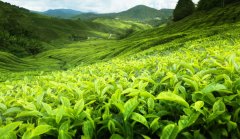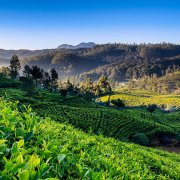Where does pure Ceylon black tea come from? What are the benefits and side effects of drinking Ceylon black tea for a long time?
A cup of tea a day can keep you away from dementia, according to a recent study by assistant professor Feng Lei of psychological medicine at the National University of Singapore (NUS) Yong toilet Lin School of Medicine. A longitudinal study of 957 Chinese graduates over the age of 55 found that daily consumption of tea reduced the risk of cognitive decline in the elderly by 50%. Apolipoprotein E4 gene carriers with genetic susceptibility to Alzheimer's disease may experience a reduced risk of cognitive impairment by up to 86%. The team also found that the neuroprotective effect of tea on cognitive function is not limited to a particular type of tea-as long as the tea is brewed with tea, such as green tea, black tea or oolong tea. Although the study was conducted on elderly Chinese, the results also apply to other races. Our findings are of great significance for the prevention of dementia. Despite high-quality drug trials, effective drug treatments for neurocognitive disorders such as dementia are still elusive, and current prevention strategies are far from satisfactory. Tea is one of the most widely consumed drinks in the world. Our research data show that a simple and inexpensive lifestyle, such as drinking tea every day, can reduce a person's risk of developing neurocognitive impairment in old age, "Associate Professor Feng explained."

He added: "according to current knowledge, the long-term benefits of drinking tea are due to bioactive compounds in tea, such as catechins, theaflavins, theanine and theanine. These compounds show anti-inflammatory and antioxidant potential and other bioactive properties and may protect the brain from vascular damage and neurodegeneration. Our understanding of the detailed biological mechanisms is still very limited, so we need more research to find a clear answer. " In this study, we collected tea drinking data of elderly people living in the community from 2003 to 2005. Before 2010, standardized tools were used to assess the cognitive function of these elderly people every two years. Information on lifestyle, medical conditions, sports and social activities was also collected. These potential confounding factors are carefully controlled in the statistical model to ensure the robustness and validity of the research results. Assistant Professor Feng and his team are planning further research to better understand the effects of Asian diet on the cognitive health of the elderly. They are also keen to investigate the effects of bioactive compounds in tea and test them more rigorously by evaluating their biomarkers, conducting randomized controlled trials or studies (randomly assigning participants to experimental or control groups to eliminate biased results). According to United Nations statistics, in 2017, the global population aged 60 and over was about 962 million, accounting for 13% of the global population. In addition, the number of people aged 60 or above is growing at a rate of about 3% a year. The number of older persons in the world is expected to reach 1.4 billion in 2030, 2.1 billion in 2050 and 3.1 billion in 2100. As the global population is aging rapidly, and this does increase the incidence of dementia, tea can greatly reduce the risk of dementia in the elderly.
Important Notice :
前街咖啡 FrontStreet Coffee has moved to new addredd:
FrontStreet Coffee Address: 315,Donghua East Road,GuangZhou
Tel:020 38364473
- Prev

Ceylon, formerly known as Ceylon, is famous for its black tea. Which Asian country now produces Ceylon black tea?
The tea industry in Sri Lanka has gone through a long process of nearly two centuries since the first tea tree was planted in the Royal Botanical Garden of Peradinia. Once commercialized, Ceylon tea soon became famous for its unique taste and high-quality raw materials. Ceylon tea is loved by tea lovers all over the world and satisfies the whole world.
- Next

How about Ceylon flavored black tea? Is flavored black tea all flavored? Ceylon black tea tastes astringent
By adding the natural flavors of flowers, herbs and fruits to black, green or oolong tea, flavored Ceylon tea retains the natural flavor of pure Ceylon tea with subtle fruit or herbal flavors to enhance your tea drinking experience. Although flavored Ceylon tea can have unlimited combinations, some tea varieties tend to be more popular and festive.
Related
- Can lightly roasted coffee beans be used to extract espresso? How finely should you grind high-quality coffee beans to make Italian latte?
- What is the difference between the world's top rose summer coffee and Yejia Shefi? What are the flavor characteristics of Yega Shefi coffee and Panama rose summer?
- The ceremony is full! Starbucks starts to cut the ribbon at a complimentary coffee station?!
- A whole Michelin meal?! Lucky launches the new "Small Butter Apple Crispy Latte"
- Three tips for adjusting espresso on rainy days! Quickly find the right water temperature, powder, and grinding ratio for espresso!
- How much hot water does it take to brew hanging ear coffee? How does it taste best? Can hot water from the water dispenser be used to make ear drip coffee?
- What grade does Jamaica Blue Mountain No. 1 coffee belong to and how to drink it better? What is the highest grade of Blue Mountain coffee for coffee aristocrats?
- What are the flavor characteristics of the world-famous coffee Blue Mountain No. 1 Golden Mantelin? What are the characteristics of deep-roasted bitter coffee?
- Can I make coffee a second time in an Italian hand-brewed mocha pot? Why can't coffee be brewed several times like tea leaves?
- Hand-brewed coffee flows with a knife and a tornado. How to brew it? What is the proportion of grinding water and water temperature divided into?

